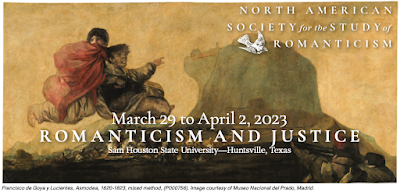My paper, which I'll be delivering virtually on March 31st, will be titled "Ancien Régime Imprisonment in the Plays of
Olympe de Gouges and Ira Aldridge." I'll be a part of a panel chaired by Sophie
Thomas from Toronto Metropolitan University, and including Marjean D. Purinton of Texas Tech, Shavera Seneviratne from the University of Minnesota, and Young-ok An of the University of St. Thomas.
The Convent, or The Forced Vows was one of de Gouges's most popular plays. It premiered in 1790, just as the French Revolution was getting started, and tells the story of a woman imprisoned against her will by an aristocratic relative who tries to force her to take vows as a nun. The play examines the injustices of the old monarchal regime just as it was being transformed. I should note that de Gouges herself wanted to reform the monarchy, not abolish it, and because she wasn't radical enough for some, she was later executed during the Reign of Terror.
Ira Aldridge, by contrast, wasn't even born until after the French Revolution, but he had become fascinated by a French melodrama called Le Docteur Noir that had been circulating in Britain where he was touring as a leading actor. An African-American man from New York, Aldridge was looking for new roles he could play without having to cover himself up in whiteface, which he frequently did when portraying white characters. The Black Doctor fit the bill.
Over the course of the play, the titular doctor runs afoul of powerful aristocrats and gets imprisoned in the Bastille. The play then re-enacts the storming of the Bastille, and shows him being liberated, but only after years of isolation have affected the doctor's sanity, a plot element that would later appear in the novel A Tale of Two Cities by Charles Dickens. Just as with A Tale of Two Cities, The Black Doctor moves beyond the giddy triumph of the masses overthrowing the Bastille and examines how the Terror attacked even family members of those who were heroes of the Revolution.
The two plays have a lot in common, so I should have more than enough to talk about in March. If you're interested in attending the conference, either in person or virtually like me, check out NASSR's conference website.
